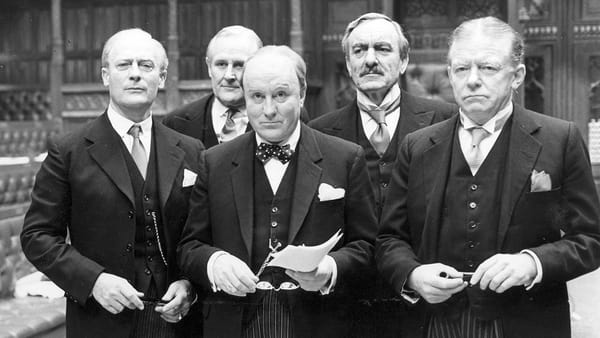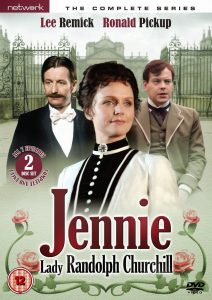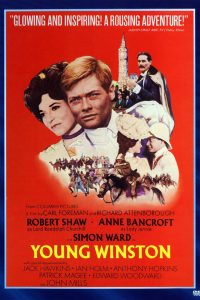
Churchill Bio-Pics: The Trouble with the Movies
“The Trouble with the Movies” was published in the American Thinker, 5 August 2017.
David Franco, reviewing the film Churchill, starring Brian Cox, raises questions he says everyone should be asking. “Isn’t the ability to accept one’s mistakes part of what makes a man a good leader? …. To what extent should we rely [on] past experiences in order to minimize mistakes in the future? These are the questions that make a bad movie like Churchill worth seeing.”
Well, I won’t be seeing this bad movie. Described as “perverse fantasy” by historian Andrew Roberts, it joins a recent spate of sloppy Churchill bio-pics that favor skewed caricatures over historical fact.
Revisionism: A Thriving Industry
Makers of movies might think it novel to criticize Churchill, but this is far from the case. Attacks on his leadership began early after World War II and have continued ever since. There’s a thriving mini-industry in “Churchill revisionism.” But it started with books, not movies.
In 1963, R.W. Thompson’s The Yankee Marlborough portrayed Churchill as a man of flesh and blood, who made mistakes, like anybody else. In his 1970 study, Churchill: A Study in Failure 1900-1939, Robert Rhodes James focused on Churchill’s political gaffes, such as his dogged support of King Edward VIII in the 1936 Abdication crisis. Edward, later Duke of Windsor, gave up the throne to marry an American divorcee. The Duke’s tepid admiration of Hitler, and dismal performance as Governor of the Bahamas, caused Churchill to reflect: “I’m glad I was wrong.”
In 1993, John Charmley’s Churchill: The End of Glory rocked Churchill’s supporters by claiming that he should have backed away from the Hitler war to preserve Britain’s wealth, power, and empire. More recently, Max Hastings criticized Churchill’s war leadership on multiple issues in both World Wars: Catastrophe 1914, on the opening months of WW1, and Winston’s War, 1940-45.
Whatever we make of their assessments, these historians were qualified critics whose thoroughly researched theses merit consideration. Alas, we cannot say the same about the recent round of Churchill movies.
Movies Faithful to Reality
Churchill movies started off well and were honest for decades. Young Winston (1972), starring Simon Ward as WSC and Anne Bancroft as his mother, was a vivid presentation based on Churchill’s own account of his first twenty-five years. Its inaccuracies stemmed from Churchill himself in his autobiography. (In it, Anthony Hopkins played David Lloyd George. Lady Randolph says: “He has the most disconcerting way of looking at women.”)
In 1974, Lee Remick brilliantly reprised the role of Lady Randolph the television series Jennie: as accurate a portrayal as ever existed. We Churchlllians gave her an award for it—the dying Lee’s last public appearance. It was attended by Gregory Peck, who co-starred with her in The Omen, who praised her “depth of womanliness.”
 That same year, Richard Burton played a believable Churchill in The Gathering Storm, about the years leading up to World War II. Again, it didn’t deviate from fact, although Burton spoiled the effect by denouncing Churchill for fictitious acts against Welsh miners, including Burton’s father. Privately, Burton had expressed his admiration for “the old boy”.…but later, the cameras were on.
That same year, Richard Burton played a believable Churchill in The Gathering Storm, about the years leading up to World War II. Again, it didn’t deviate from fact, although Burton spoiled the effect by denouncing Churchill for fictitious acts against Welsh miners, including Burton’s father. Privately, Burton had expressed his admiration for “the old boy”.…but later, the cameras were on.
The 1981 TV series Churchill: The Wilderness Years, remains the model Churchill bio-pic. Herein Robert Hardy showed us both Churchill’s human frailties and his greatness. Hardy and his writers partnered with Churchill’s official biographer, Sir Martin Gilbert to portray the anxious politician of the 1930s, out of power, vainly warning of the Nazi menace. Brilliantly cast, the result was a masterpiece.
More Recently…
Albert Finney was a solid Churchill in the second Gathering Storm (2002), a 90-minute film for television. As skillfully cast as The Wilderness Years, it featured Vanessa Redgrave in a bavura performance as Clementine Churchill. The story line, while not uncritical, did not deviate from fact. Even in the cynical, anti-heroic 21st century, it seemed, filmmakers could still tell his story without reducing Churchill to a flawed burlesque or godlike caricature. Then came “Into the Storm,” a 2009 television drama broadcast by the BBC and HBO. Here in a series set in 1945 with 1940 flashbacks, Brendan Gleeson gave us the most accurate Churchill since Robert Hardy. Things were looking good.
Or so I thought. Alas, in the last couple of years, we’ve had three films which can only be described as “fake history,” and a one-dimensional documentary that fails to tell the full story.
A Turn to the Worse
The Crown, a 2016 Netflix series covering the early reign of Queen Elizabeth II, was well acted. But John Lithgow portrayed a senile prime minister who hides his 1953 stroke from the Queen and repeatedly paints his goldfish pond in a muddle of depression. Factually, the Queen knew of Churchill’s stroke three days after it happened—and he was never so dotty as to make repeated paintings of his fish pond. The Duke of Windsor resurfaces here, promising that he will get the new Queen to move into Buckingham Palace if Churchill restores his royal allowance. Where do they think of this stuff?
Viceroy’s House has not been seen yet in the US, and we’re missing nothing. A visually elaborate production, it covers the end of British rule in India, under the last Viceroy, Lord Mountbatten, whitewashing the latter at Churchill’s expense. Mountbatten’s insistence that Britain leave before the India-Pakistan boundaries were settled led to violent strife and the massacre of millions. Somehow, the film manages to blame this on Churchill, who was not even in power at the time.
* * *
Churchill starring Brian Cox is built around the myth that Churchill opposed D-Day virtually to the moment of the Normandy landings. In reality, Churchill had sought “a lodgment on the continent” since the British were thrown out of Dunkirk in 1940. His concept of floating “Mulberry Harbors” for landing tanks and equipment dated back to 1917. This hasn’t prevented Mr. Cox from flaunting his ignorance in interviews repeating a host of canards, including the notion that Churchill wanted to invade Germany over the Alps.
I held my breath when the film Dunkirk appeared, hoping it would not be another dose of lame propaganda. Churchill doesn’t appear in it. But his absence, along with other heroes of the Dunkirk evacuation, reduces the film to a one-dimensional portrait. It’s war on a beach, with moving scenes of heroism and survival. Who was the enemy? A viewer has no idea why Churchill said after Dunkirk, “We shall never surrender”—though his words are read movingly by a soldier in the final scenes.
Hope Ahead? We’ll See
There’s no question that fictitious scenes and conversations are legitimate devices in bio-pics. But they must not depart from what we know. And thanks to historians like Martin Gilbert and the Hillsdale College Churchill Project, we know a lot.
There is cause for hope. This autumn, Gary Oldman will star as Churchill in another bio-pic, Darkest Hour, about facing Hitler’s armies in 1940. Promisingly, Oldman has consulted with qualified historians, striving to find “a way in” to the real Churchill. Colleagues who’ve seen previews say he has Churchill down perfectly. But his script contains some bizarre counterfactuals.
One can only wish him success. Perhaps this film will answer David Franco’s questions. Yes, accepting one’s mistakes does make a person a good leader. Yes, Churchill did learn from his mistakes. He was a man of quality—a good guide for our troubled decade. And after a long lapse, he deserves a film that does him justice.








2 thoughts on “Churchill Bio-Pics: The Trouble with the Movies”
Whoops, sorry! I thought it was good. Click here for review. Added to my post: “Into the Storm” was a 2009 television drama broadcast by the BBC and HBO. In a film set in 1945 with 1940 flashbacks, Brendan Gleeson gave us the most accurate Churchill since Robert Hardy.
What about “Into the Storm” the 2009 biopic with Brendan Gleeson as Churchill? What did you think of that movie?
Comments are closed.